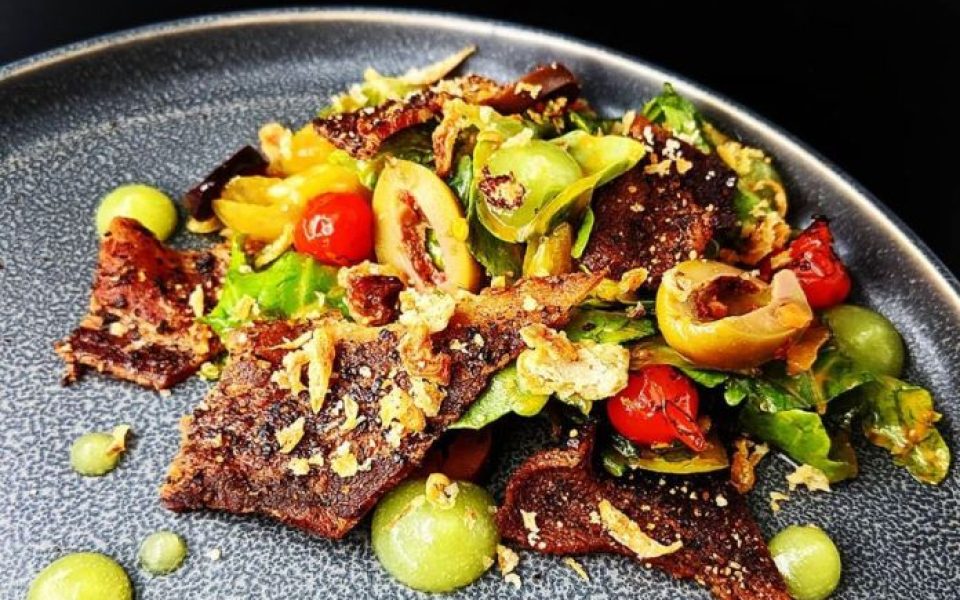
DThe cast-iron Dutch oven was heavy. When the lid came off, steam billowed from the open vessel. Along with it came a smoky, aromatic scent that goes with slow-roasted meats onions, garlic and herbs. A peek inside revealed several fat duck legs with skin that had crisped up and curled like a blanket protecting the tender, succulent meat. All nestled in a pile of glistening dark red beans swimming in a deep, rich amber sauce seasoned aggressively with black peppercorns and garnished lightly with fresh herbs. Someone wielded two forks and purposefully shredded the meat, tossing aside the crispy skin to reveal strands of perfectly roasted bits of fowl. This was the fourth course of nearly 10 presented during a private supper club dinner where the invitation was the reward after 5 long years on the waiting list.
Supper clubs of the past were brick-and-mortar establishments: entertainment-anchored, alcohol-fueled, social meccas full of second-rate food with an air of weathered sophistication. At least that’s how they were described through archives and the words of journalists past. Plantation Supper Club, Green’s on US 29 and the Tropicana on High Point Road all had their time and place within the area’s dining culture. These establishments were for people to let their hair down, get glammed up and to meet and greet each other on Saturday nights when there wasn’t much else going on. During the week, these supper clubs still opened to packed rooms with live bands and mounds of food, but none of that was what drew people in. It was the lure of social interaction; to see and be seen, the promise of a good time.
Fast forward to the 21st Century and supper clubs have changed. You can still find old-school, traditional supper clubs in the Midwest, but in many cities, supper clubs operate as sort of a secret society. The music may be a Spotify playlist. The alcohol is BYOB with an option of a pre-dinner cocktail provided by the host. The dress code is come-as-you-are. The guest list is curated by a hidden, unspoken electronic invitation extended through social media accounts and listservs. Most operate the same as a restaurant or prix fixe wine dinner. Some are run by current and former industry people. Personally, I know of four different supper clubs in Greensboro who are filling the bill for this mid-century throwback.
Once you’ve been granted admission, you never know who else will be joining. Each dinner has a theme with multiple courses with as much, if not more, care and attention than restaurant plating has. In some cases, the menu is revealed after you arrive. In most cases, there are surprises, lagniappes and takeaways. All accept donations and suggest an amount simply to cover costs. And of course, tips are always appreciated.
There’s always a bit of hesitation and curiosity when you arrive, like being a guest for the first time at a new friend’s home. All of those feelings are shed, just like your coat, once you enter and are greeted by the hosts. Fast friends are made. The cameraderie and shared experiences are free. The crowd could be well-seasoned veterans who hold fountains of wealth of knowledge about the dining scene over the years. The crowd could be young professionals who like to eat and Instagram their meals. The crowd could be a mix of young, old, neophytes or transplants. Tales of domestic and international travel dance across the table. Once, a woman wove a personal narrative about leaving her rent-controlled apartment in the Lower East side of Manhattan to follow love, ending up in Greensboro and making a life for herself after the union dissolved. The food brought us together, but the conversation around the meal is what sets each event apart from the others.
Ask a friend or ask me and I will tell you: these underground suppers are here and they are not going away any time soon. While the supper clubs of the past may not exist anymore, the present of communal dining has taken on a new look and the future looks good and highly flavored.
Join the First Amendment Society, a membership that goes directly to funding TCB‘s newsroom.
We believe that reporting can save the world.
The TCB First Amendment Society recognizes the vital role of a free, unfettered press with a bundling of local experiences designed to build community, and unique engagements with our newsroom that will help you understand, and shape, local journalism’s critical role in uplifting the people in our cities.
All revenue goes directly into the newsroom as reporters’ salaries and freelance commissions.


How does one find a supper club? My wife and I would love this experience!